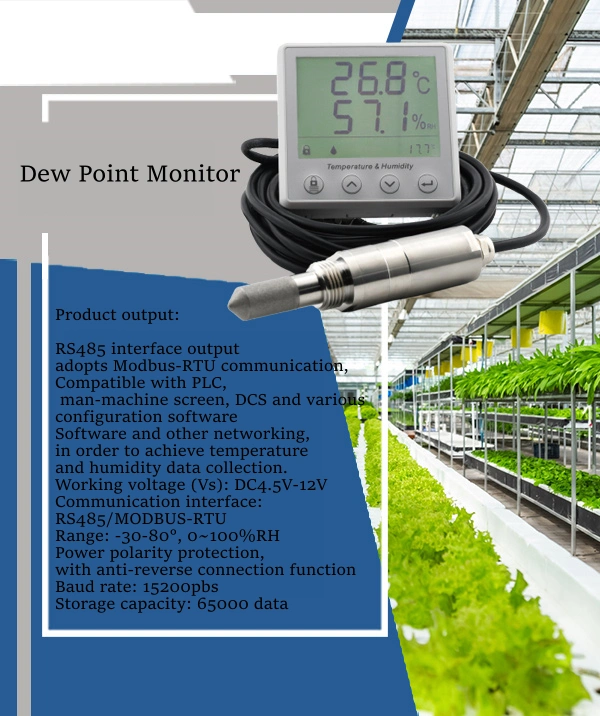Dew point monitors play a pivotal role in the thriving world of the fruit and vegetable industry. It can make the difference between a fresh, quality harvest and a subpar one. The dew point, a measure of atmospheric humidity, impacts everything from farming and storage to transport and retail.
Accurate monitoring of the dew point helps manage moisture levels, ensuring optimal growing conditions and preserving freshness during storage and transport. More importantly, it safeguards the quality that consumers demand and expect.

What is Dew Point ?
Dew point is a term that might seem a bit scientific, but it’s quite simple once you break it down. Essentially, it’s the temperature at which the air becomes saturated with water vapor. When this happens, the vapor condenses into tiny drops of dew. You’ve probably noticed this phenomenon on cool mornings when you see droplets forming on the grass or on your car windows.
Why does the dew point matter, especially in the fruit and vegetable industry? Simply put, it’s all about controlling moisture. Just like us humans, fruits and vegetables are mostly water. So, they’re sensitive to the moisture in the air around them. If the air is too dry, they can shrivel and lose their freshness. But if it’s too humid, they can become overly moist and prone to rotting.
Advanced dew point monitors, like the ones our company provides, measure the air’s moisture content and temperature. They then use this information to calculate the dew point. With this data at your fingertips, you can ensure the best conditions for growing, storing, and transporting your fruits and vegetables.
Why Dew Point Monitoring is Essential for the Fruit and Vegetable Industry
Dew point monitoring holds a crucial role in the fruit and vegetable industry. It’s all about preserving that garden-fresh quality, from the field to the consumer’s table.
The dew point affects the quality of fruits and vegetables in several ways.
When the dew point is high, indicating a lot of moisture in the air, fruits and vegetables can absorb excess water. This might lead to faster spoilage and loss of firmness.
On the flip side, when the dew point is too low, the air is dry, which can cause fresh produce to lose moisture, shrivel up, and lose its appealing, fresh-picked look.
When it comes to storage and preservation, controlling the dew point is key. By monitoring the dew point, storage facilities can adjust humidity levels to prevent dehydration or over-saturation. This extends shelf life and maintains the appearance and nutritional value of the produce.
A prime example of dew point’s importance can be seen in apple storage. Apples are stored at low temperatures to extend their freshness. However, if the dew point isn’t carefully controlled, the cold environment could lead to condensation, a perfect breeding ground for molds and bacteria. By using dew point monitors, storage facilities can balance humidity, temperature, and dew point to prevent such issues and keep apples crisp and fresh for longer.
Through our dew point monitors, the fruit and vegetable industry can maintain this delicate balance and ensure the delivery of high-quality produce all year round.
Applications of Dew Point Monitors in the Fruit and Vegetable Industry:
Farming: Monitors provide real-time dew point data to help farmers optimize their irrigation schedules, preventing overwatering and under watering.
Transport: In climate-controlled vehicles, dew point monitors maintain optimal humidity levels, preventing produce from drying out or absorbing excess moisture during transport.
Storage: Monitors enable precise control of storage conditions, extending the freshness of produce, avoiding condensation, and preventing rot.
Benefits of Accurate Dew Point Monitoring:
Quality Assurance: Regular monitoring ensures the quality and longevity of produce from farm to table.
Efficiency: Minimizing spoilage and waste helps businesses run more efficiently.
Competitiveness: By delivering high-quality produce, businesses can gain a competitive edge in the market.
Sustainability: Efficient use of resources contributes to a more sustainable food system.
More Gas Detection Sloutions
What Is a Dew Point Monitor and How to Choose One?
The Role of Dew Point Meter for Compressed Air Systems
More than Just Compressed Air! What Gases Can the Dew Point Meter Detect?
Top 1 Guide to Dew Point Measurement
What Is Zirconia Oxygen Sensor?
In conclusion, dew point monitoring is essential for the fruit and vegetable industry. It’s a vital tool at every stage, from farming and transport to storage. By maintaining optimal moisture levels, dew point monitors help ensure the freshness, quality, and longevity of produce.
Our dew point sensors at Sino-Inst bring this crucial monitoring to your fingertips. They offer precision, user-friendly interfaces, and seamless integration into your existing systems. But what sets us apart is our rich experience as a manufacturer and supplier, our dedication to quality, and our commitment to our customers.
Reach out to us at Sino-Inst, and let our team guide you to the right dew point monitoring solution for your needs.
Request a Quote
Wu Peng, born in 1980, is a highly respected and accomplished male engineer with extensive experience in the field of automation. With over 20 years of industry experience, Wu has made significant contributions to both academia and engineering projects.
Throughout his career, Wu Peng has participated in numerous national and international engineering projects. Some of his most notable projects include the development of an intelligent control system for oil refineries, the design of a cutting-edge distributed control system for petrochemical plants, and the optimization of control algorithms for natural gas pipelines.